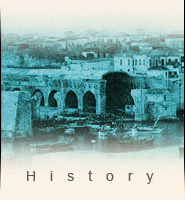
The Cretan Question
The decline of the Ottoman Empire accelerated year by year, earning it the far from flattering sobriquet "Sick Man of Europe" current in 19th century diplomatic parlance. Increasing Ottoman dependence on the European Powers permitted the latter to intervene ever more in internal affairs. The fate of the vast empire became the renowned "Eastern Question" - a cause of intense jockeying between the Great Powers of the time, who quite naturally often had conflicting interests.
"The Cretan Question" was one of the thorniest issues relating to the Eastern Question. As the term indicates, in essence it was the problem that arose over determining the future fate of Crete. Through continued rebellions, the Christians sought to cast off Ottoman domination and bring about union with the free Greek state. On the other hand, the Ottoman Empire sought to retain sovereignty over the island. Added to this, the conflicting interests of the great European powers rendered any solution to the problem difficult.
The band of the 2nd Royal Sussex Regiment (R. Behaeddin, Vikelaia Municipal Library, Heraklion)
Prince George of Greece inspecting British troops in Heraklion on Queen Victoria's birthday, 1890
British troops encamped on the curtain wall between the Pantocrator Bastion and the Saint Andrew Bastion after the riots of 25th August 1898
1669
1669
1669
1669
1671
1681
1688
1691
1692
1715
1735
1735
1770
1771
1780
1810
1810
1812
1821
1822
1822
1823
1824
1825
1828
1830
1831
1833
1840
1841
1850
1856
1858
1858
1862
1862
1866
1866
1868
1869
1875
1878
1878
1881
1889
1895
1895
1897
1897
1898
1898
1898











